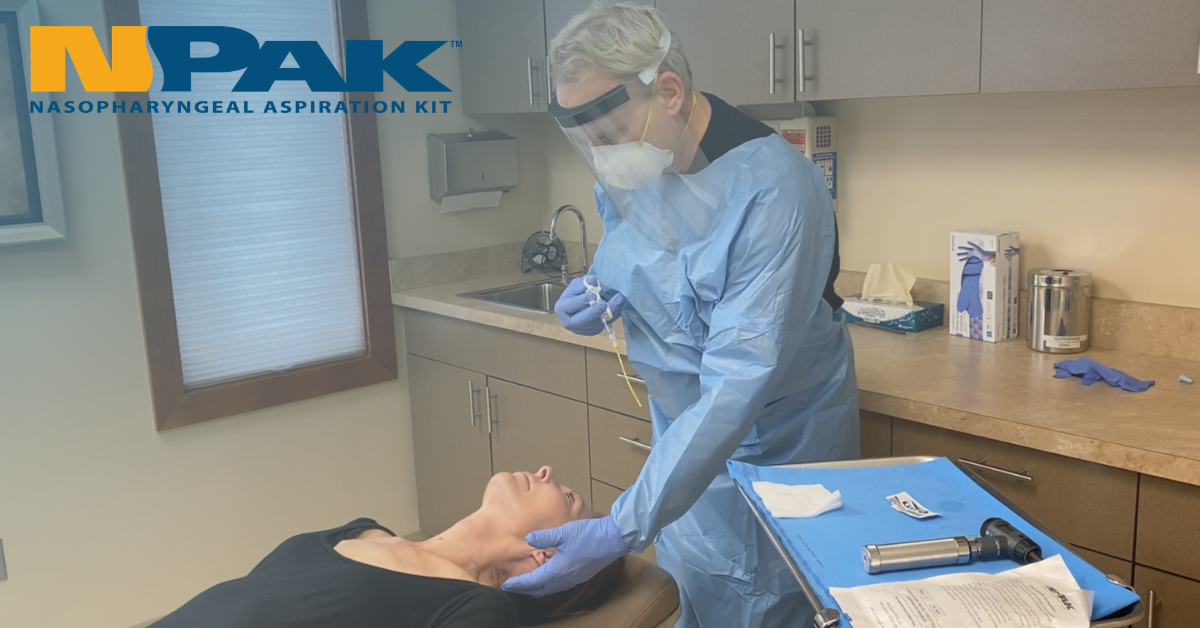N-PAK allows you to get paid for specimen collection for COVID-19 - CPT CODE 31720-52
In addition to already paid lab testing

2020 Coding and Payments for Procedures that May Involve N-Pak
Data from the Case Study of a Private Practice in 2020 for COVID-19 Specimen Collection
-
CPT Code 31720-52 used for each Nasopharyngeal aspirate performed.
- 100% success rate to date
- Reimbursement Range: $19.85 - $102.83
- Reimbursements Average: $52.31 / NP aspirate used for specimen collection. (This was specific to specimen collection and billing for E and M reimbursement/Covid lab test not included in this amount and may be additional reimbursement to each clinic)
INDICATION OF USE
Nasopharyngeal aspiration (NPA) is the "gold standard" and preferred method for collecting specimens for all viral pathogens in patients with respiratory tract infection, including COVID-19.
Covid Specimen Collection
(CDC Recommendations)
In the CDC Interim Guidelines for Collecting, Handling, and Testing Clinical Specimens from Persons Under Investigation (PUIs) for Coronavirus Disease 2019 (COVID-19), the CDC recommends taking a nasopharyngeal aspirate for COVID-19 for upper respiratory tract samples. The CDC guidelines also direct healthcare workers to have the NP aspirate of 2-3 mL in a sterile, leak-proof, screw-cap sterile dry container therefor after the NP aspirate is obtained using N-Pak, the syringe can simply be capped and labeled. Store specimens at 2-8°C for up to 72 hours after collection. If a delay in testing or shipping is expected, store specimens at -70°C or below[1].
For initial diagnostic testing for SARS-CoV-2, CDC recommends collecting and testing an upper respiratory specimen. Please contact the testing laboratory to confirm accepted specimen types. The following are acceptable specimens depending on the authorized SARS-CoV-2 viral test used:
- A nasopharyngeal (NP) specimen collected by trained healthcare personnel; or
- An oropharyngeal (OP) specimen collected by trained healthcare personnel; or
- A nasal mid-turbinate swab collected by trained healthcare personnel or by a supervised onsite self-collection (using a flocked tapered swab); or
- An anterior nares (nasal swab) specimen collected by trained healthcare personnel or by supervised home or onsite self-collection (using a flocked or spun polyester swab); or
-
Nasopharyngeal wash/aspirate or nasal wash/aspirate (NW) specimen collected by trained healthcare personnel. (THIS IS THE ONLY TEST THAT REIMBURSES FOR COLLECTION OF SPECIMEN AND GIVES THE HIGHEST SENSITIVITIES BASED ON PREVIOUS STUDIES.)
- A saliva specimen collected by supervised self-collection.
Disclaimer
The information provided in this guide contains general reimbursement information only and is not legal advice nor is it advice about how to code, complete, or submit any particular claim for payment. Information provided is not intended to increase or maximize reimbursement by the health plan. The information provided represents M-Pro, LLC’s understanding of current coding and reimbursement policies. M-Pro, LLC disclaims all responsibility related to provider billing. It’s the provider’s responsibility to determine appropriate codes, charges, and modifiers, and submit claims for the services consistent with the patient insurer requirements and clinical work up. Third-party insurers policies and coding requirements vary and are updated routinely. Such policies can change over time. Providers should check and verify current policies and requirements with the health plan for any particular patient.
References
- Centers for Disease Control and Prevention. (2020, February 14). Coronavirus Disease 2019 (COVID-19): Guidelines for Clinical Specimens. Retrieved February 27, 2020, from https://www.cdc.gov/coronavirus/2019-nCoV/lab/guidelines-clinical-specimens.html
©2020 M-Pro, LLC
01/01/2020

